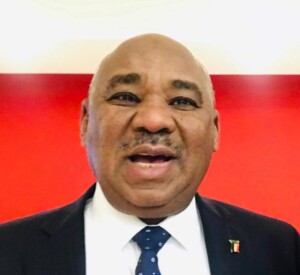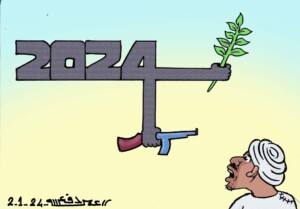Prime Minister Hamdouk presents new Sudanese government
Prime Minister Abdallah Hamdouk announced his transitional government yesterday evening at the Council of Ministers’ Secretariat. Four of the 18 ministers are women: Foreign Affairs, Higher Education, Labour and Social Development, and Youth and Sports.
 Prime Minister Abdallah Hamdouk (SUNA)
Prime Minister Abdallah Hamdouk (SUNA)
Prime Minister Abdallah Hamdouk announced his transitional government yesterday evening at the Council of Ministers' Secretariat. Four of the 18 ministers are women: Foreign Affairs, Higher Education, Labour and Social Development, and Youth and Sports.
As agreed in the deal between the Transitional Military Council (TMC) and the Forces for Freedom and Change (FFC) the military could propose the Ministers of Defence and Interior. All the other ministers were proposed by the FFC.
The new ministers are:
- Interior Affairs: Gen El Tereifi Dafallah
- Federal Government: Yousef El Dei
- Foreign Affairs: Asmaa Abdallah
- Justice: Nasreldin Abdelbari
- Finance: Dr Ibrahim El Badawi
- Defence: Lt Gen Jamal Omar
- Cabinet Affairs: Omar Manis
- Health: Dr Akram El Tom
- Education: Dr Mohamed El Amin El Tom
- Higher Education: Dr Intisar El Zein
- Industry and Trade: Madani Abbas
- Energy and Mining: Adil Ibrahim
- Irrigation and Water Resources: Yasir Abbas
- Agriculture: Eisa Osman
- Labour and Social Development: Lina El Sheikh
- Culture and Information: Feisal Mohamed Salih
- Religious Affairs: Nasreldin Mofara
- Youth and Sports: Walaa El Boushi
The prime minister pointed out that names of the Ministers of Livestock and Infrastructure will be announced later. He said that the delay in the formation of the new government was caused by the need to have a government that can represent everybody in Sudan.
The new government is expected to be sworn in on Sunday.
Good nation
At a press conference earlier this week Hamdouk said that Sudan “left for a while but is coming back as a good nation”.
“Sad years we were isolated. We were treated as a pariah state. We want to be seen as a country that is upholding human rights, good governance, peace and security, at ease with itself and with its neighbours.
Hemeti
Asked whether he trusts Hemeti (the nickname of Lt Gen Mohamed Hamdan), military member of the Sovereign Council and commander of the feared Rapid Support Forces militia that supported the former government, Hamdouk said: “We went through four to five months of deep negotiations. By the establishment of the Sovereign Council the military and the civilians are in a partnership. We will have to make it work. There is no other choice. Nobody is expecting it to be a fait accompli or easy. I will do it.”
Arab spring
Comparing the Arab spring in other countries, te Prime Minister remarked that Tunisia now is a democracy and has a multiparty system. “Libya and Syria went the other way. Egypt is somewhere in between. Sudan is different from all of them, because we have a very vibrant, rich political history, and political class. We have well entrenched, resilient political parties. That makes it different from all the other countries.”
SST list
Hamdouk said that the USA should drop Sudan from the SST list (state sponsor of terrorism). “A democratic Sudan is not a threat to anybody in the world. Of course, we understand this is a process. We are happy to talk to our friends and partners in the US government. We hope the Sudanese people will be rewarded by dropping the SST. It is key to anything we can do to unlock this country, even to American investment.”
Peace dividend
Speaking about parallel channels for resources [referring to money directly going to the army or militia] Hamdouk said that he wants the whole budget to be controlled by the Ministry of Finance and the Central Bank of Sudan in order to be able to establish a solid macro-economic policy. “We are also looking for a peace dividend. If we have peace, we hope the military budget can come down from 70-80 per cent to 15-20 per cent. The rest should go to development, health, education, infrastructure and reviving the economy.”
Last frontier
Sudan offers tremendous opportunities for investment, Hamdouk said. “This is the last frontier. The rest of the world has finished its infrastructure. Here we still need to build our roads, our towns, our energy projects, our ports… The return on investment in this part of the world is probably the highest. Build, pay taxes and make profit.”
Our editorial independence means that we can continue to provide factual updates about political developments to Sudanese and international actors, educate people about how to avoid outbreaks of infectious diseases, and provide a window to the world for those in all corners of Sudan. Support Radio Dabanga for as little as €2.50, the equivalent of a cup of coffee.












 and then
and then